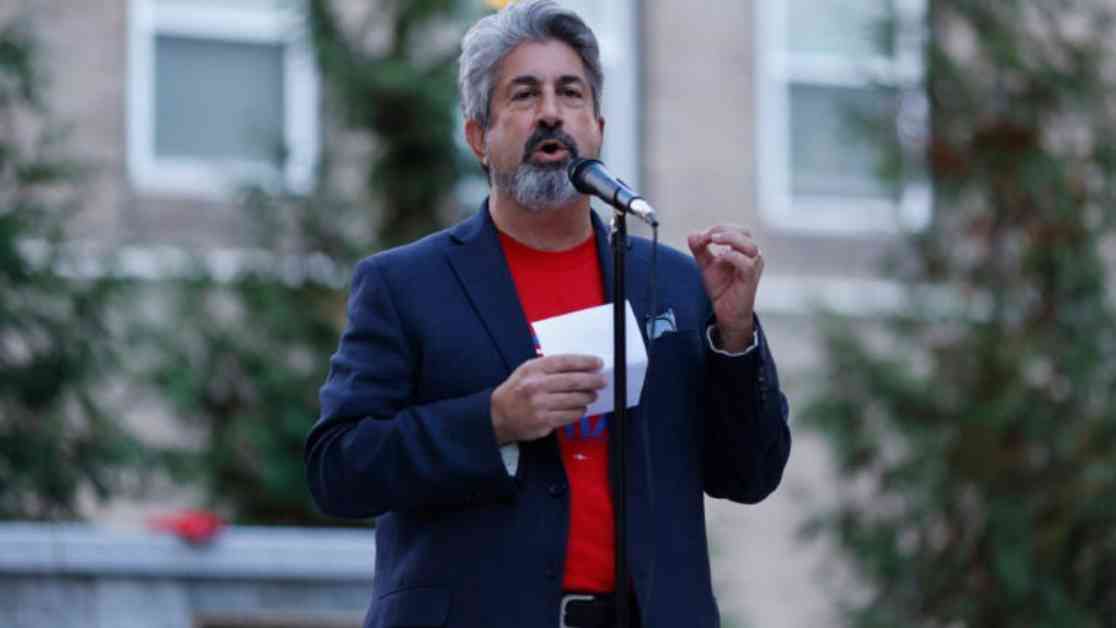The Massachusetts Teachers Association (MTA) came under intense scrutiny this week as members of the Special Commission on Combatting Antisemitism accused the organization of distributing materials that were deemed antisemitic and offensive. The hearings that took place in the State House saw MTA President Max Page facing a barrage of questions regarding the materials provided to teachers about the Israel-Hamas conflict. The commission alleged that the materials did not present a fair Israeli or Jewish perspective on the conflict, leading to a heated debate between the two parties.
The commission gathered over two dozen examples of materials distributed by the MTA, which they believed were problematic. These materials, available through a members-only section of the MTA website, were not widely distributed and were not part of a specific curriculum. Page clarified to the commission that the MTA’s posting of these documents did not signify agreement with the views expressed in them and that members were expected to approach all resources critically. He emphasized that educators should not be seen as robots who could be brainwashed by a single set of resources.
During the hearing, State Senator John Velis, the cochair of the commission, expressed concerns about the one-sided nature of the resources and the potential for teachers to develop antisemitic opinions. State Rep. Simon Cataldo, the other cochair, highlighted specific examples of the materials in question, including posters and a storybook that depicted controversial narratives related to the Israel-Palestine conflict. Cataldo’s line of questioning led to visible frustration from Page, who questioned the nature of the inquiry.
Amidst the tense atmosphere of the hearing, an audience member interrupted Cataldo’s questioning, likening him to “Senator McCarthy,” drawing parallels to the historic attempts to uncover communists in the U.S. government. The exchange underscored the charged nature of the discussion surrounding the MTA’s materials and their potential implications.
This is not the first time the MTA and Page have faced criticism for their stance on the Israel-Palestine conflict. Previous incidents, including accusations of antisemitic dog-whistling and promoting anti-Israel propaganda, have drawn condemnation from various organizations. Page addressed these accusations during the hearing, refuting claims of indoctrination and highlighting the threats and attacks the MTA has faced as a result.
Following the hearing, Page and MTA Vice President Deb McCarthy issued a joint statement denouncing the commission’s actions as “political grandstanding” that did little to combat antisemitism. Page, drawing on his personal experiences as a practicing Jew with family ties to the Holocaust, emphasized the need to address rising antisemitism while recognizing the fears of Palestinian educators and students within the larger political context of America.
As the debate surrounding the MTA’s materials continues, Page stressed the interconnected nature of antisemitism with other forms of hatred and discrimination, calling for a comprehensive approach to combatting all forms of oppression. In a rapidly changing political landscape, where divisive rhetoric and censorship tactics are on the rise, the MTA’s struggle to navigate these complex issues reflects broader societal challenges that require nuanced and thoughtful engagement.
Ross Cristantiello, a seasoned news reporter covering a range of topics for Boston.com, provides invaluable insights into the unfolding narrative of the MTA’s contentious hearings and the broader implications for combating antisemitism in today’s society. With a keen eye for detail and a commitment to journalistic integrity, Cristantiello’s reporting sheds light on the complexities of the situation while emphasizing the importance of addressing hate in all its forms.






